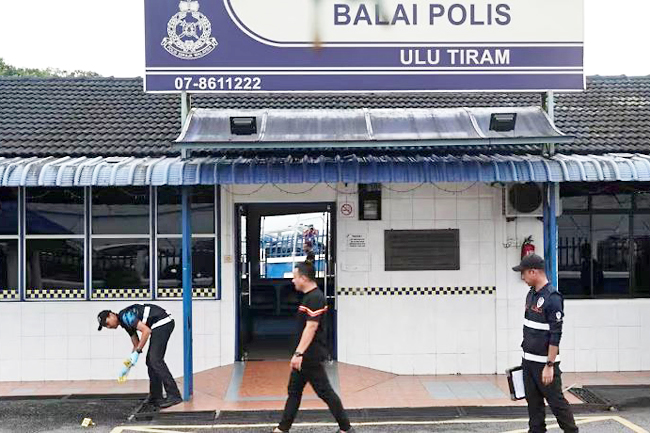CNA – Five family members of the suspect behind the deadly attack on a police station in Johor Bahru’s Ulu Tiram last week have been remanded further under the Security Offences (Special Measures) Act 2012 (SOSMA), said Malaysia’s police chief Razarudin Husain on Friday.
The pre-dawn attack last Friday left two policemen dead and another injured. The suspect was shot dead during a firefight with the police, and his parents and three siblings have been in custody since last Friday.
SOSMA has been used by Malaysia authorities for internal security issues including public order, acts of terrorism, sabotage and espionage.
Under the Act, the police may detain a person for up to 28 days and bail shall not be granted to those arrested. If charged, the offences will be tried by the High Court.
Extending the five suspects’ detention would give the police more time with investigations, Malaysia’s Home Affairs Minister Saifuddin Nasution Ismail said at a separate press conference on Thursday.
Both Saifuddin and Razarudin, who is Inspector-General of Police, shed more light on the alleged attacker and his family.

Razarudin affirmed the alleged attacker’s father is suspected to be a member of Jemaah Islamiyah (JI). “That’s right, it’s under our data and records,” he said.
JI is a group responsible for some of the region’s deadliest terror attacks, including the 2002 Bali bombings that killed more than 200 people.
The four children in the family did not finish school – the suspect only studied until primary four, while his younger sister was not sent to school. The eldest sibling, a woman, studied until primary six while the second child, a male, was educated until primary five, said Razarudin.
“The beliefs and ideology within this family are radical,” he added.
Based on police interviews with people from the community and others with JI links, Saifuddin said the family had isolated themselves and held beliefs that had negative implications for others.
“We have established that the family did not mix with the community, and the reason they gave was that they view others as kafir (infidels). So they do not go to the mosque to pray because it was built by the government … and deemed kafir,” said Saifuddin.
“We see this strongly held belief among them that only they are (followers of) Islam, and the rest are infidels … the implication is big because it means the breaking of ties between one another and brings about bad implications to the community and country,” he added.



















































